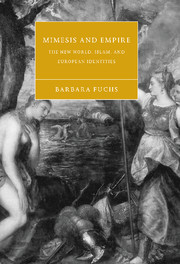Book contents
- Frontmatter
- Contents
- Acknowledgments
- Note on translations
- Introduction
- 1 Truth, fictions, and the New World
- 2 Literary loyalties, imperial betrayals
- 3 Lettered subjects
- 4 Virtual Spaniards
- 5 Faithless empires: pirates, renegadoes, and the English nation
- 6 Pirating Spain
- Conclusion: Contra originality
- Notes
- Bibliography
- Index
- Cambridge Studies in Renaissance Literature and Culture
Introduction
Published online by Cambridge University Press: 22 September 2009
- Frontmatter
- Contents
- Acknowledgments
- Note on translations
- Introduction
- 1 Truth, fictions, and the New World
- 2 Literary loyalties, imperial betrayals
- 3 Lettered subjects
- 4 Virtual Spaniards
- 5 Faithless empires: pirates, renegadoes, and the English nation
- 6 Pirating Spain
- Conclusion: Contra originality
- Notes
- Bibliography
- Index
- Cambridge Studies in Renaissance Literature and Culture
Summary
Cuzco, Peru, 1570. As Viceroy Francisco de Toledo makes his formal entrance into the city, he is greeted with elaborate pageantry. In the main square, once site of the Inca festivals, a Moorish castle and an enchanted wood have been erected for the celebration. The mock-Moors emerge from the castle to capture young women at a fountain, only to be pursued by valiant Christian knights, who engage them in fierce mock combat. The conquistadors play “themselves.” The Moors are played by the Indians.
Bristol, England, 1613. To celebrate Queen Anne's visit, the city stages a water-combat between a Christian ship and two Turkish galleys. After a lively mock battle, the “Turks” are brought as prisoners before the Queen, who laughingly observes that they are “not only like Turks by their apparell, but by their countenances.”
The representation of an encounter with the other is always fraught with difficulties. To mime such an encounter is also, fundamentally, to set the self adrift in a space where identity becomes nothing but props and costume. The two examples above convey some sense of the complexity of intercultural performance on early modern imperial stages. In the first, a time-honored Mediterranean script is produced in an American setting, casting the natives of the New World as the Islamic bogeymen of the Old.
- Type
- Chapter
- Information
- Mimesis and EmpireThe New World, Islam, and European Identities, pp. 1 - 12Publisher: Cambridge University PressPrint publication year: 2001

